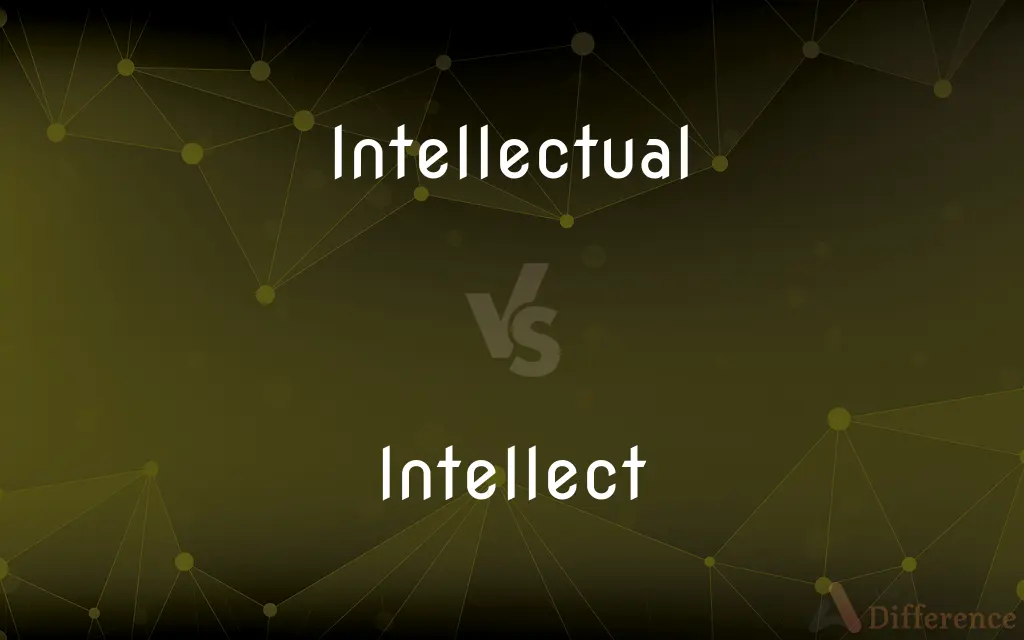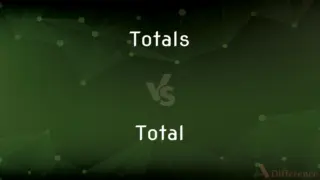Intellectual vs. Intellect — What's the Difference?
By Tayyaba Rehman & Maham Liaqat — Updated on April 17, 2024
Intellectual refers to someone possessing or exhibiting intellect, while intellect denotes the faculty of reasoning and understanding objectively.

Difference Between Intellectual and Intellect
Table of Contents
ADVERTISEMENT
Key Differences
Intellectual is typically used as an adjective or noun to describe a person engaged in or suited for thought and learning, whereas intellect is a noun that refers to the mental capacity for reasoning, understanding, and acquiring knowledge.
Intellectual activities involve deep thinking, such as philosophical debates or literary critiques, on the other hand, intellect is the cognitive ability that one uses to perform these activities.
An intellectual person often seeks knowledge and enjoys intellectual pursuits, whereas a person's intellect is their mental toolset that enables these pursuits.
Intellectual can also describe things related to the intellect, such as intellectual discussions or intellectual property, while intellect itself remains the abstract capacity or faculty within a person.
The development of one's intellectual capabilities is often linked to educational and cultural experiences, whereas intellect refers to both innate cognitive abilities and those developed through learning.
ADVERTISEMENT
Comparison Chart
Part of Speech
Adjective or noun
Noun
Usage
Describes a person or activities
Describes mental faculties
Associated Activities
Engaging in thought, debates, studies
Reasoning, understanding, learning
Example Context
Intellectual debates, intellectual property
High intellect, development of intellect
Focus
On the manifestation or environment
On the inherent or developed capabilities
Compare with Definitions
Intellectual
Relating to the mind or intellect.
She enjoys intellectual games like chess that challenge her mind.
Intellect
The faculty of reasoning and understanding objectively.
His intellect is evident in his problem-solving abilities.
Intellectual
A person possessing a high degree of knowledge or intellect.
The conference gathered intellectuals from various fields.
Intellect
Cognitive mental abilities.
The philosopher argued about the nature of the human intellect.
Intellectual
Suited to or intended for thinking and understanding.
The book is an intellectual exploration of ancient philosophies.
Intellect
The capacity for thinking and acquiring knowledge.
Her intellect has grown significantly since she started university.
Intellectual
Pertaining to learning or the intellect.
She contributed to the intellectual capital of the institution.
Intellect
Mental powers or capabilities.
The test measures the range of children's intellect.
Intellectual
Engaged in activities requiring the use of intellect.
He prefers intellectual discussions over small talk.
Intellect
The use of knowledge to think and reason.
His intellect saves him in complex situations.
Intellectual
An intellectual is a person who engages in critical thinking, research, and reflection to advance discussions of academic subjects. This often involves publishing work for consumption by the general public that adds depth to issues that affect society.
Intellect
In the study of the human mind, intellect refers to and identifies the ability of the mind to reach correct conclusions about what is true and what is false, and about how to solve problems. The term intellect derives from the Ancient Greek philosophy term nous, which translates to the Latin intellectus (from intelligere, “to understand”) and into the French and English languages as intelligence.
Intellectual
Relating to the intellect
Children need intellectual stimulation
Intellect
The ability to learn and reason; the capacity for knowledge and understanding
"Opinion is ultimately determined by the feelings, and not by the intellect" (Herbert Spencer).
Intellectual
A person possessing a highly developed intellect
A prominent political thinker and intellectual
Intellect
A person's individual ability to think and reason
"[His] humanitarianism could never overcome the rigidities of his intellect or the shortcomings of his temperament" (Michael B. Stoff).
Intellectual
Of or relating to the intellect.
Intellect
A person of great intellectual ability
"Gifted as both an athlete and an intellect, [he] received help from teachers who recognized his talents" (Anita Silvey).
Intellectual
Rational rather than emotional
An intellectual decision.
Intellect
(uncountable) The faculty of thinking, judging, abstract reasoning, and conceptual understanding; the cognitive faculty.
Intellect is one of man's greatest powers.
Intellectual
Appealing to or engaging the intellect
An intellectual book.
An intellectual problem.
Intellect
(uncountable) The capacity of that faculty (in a particular person).
They were chosen because of their outstanding intellect.
Intellectual
Having or showing intellect, especially to a high degree.
Intellect
A person who has that faculty to a great degree.
Some of the world's leading intellects were meeting there.
Intellectual
Given to activities or pursuits that require exercise of the intellect.
Intellect
The part or faculty of the human mind by which it knows, as distinguished from the power to feel and to will; the power to judge and comprehend; the thinking faculty; the understanding.
Intellectual
An intellectual person.
Intellect
The capacity for higher forms of knowledge, as distinguished from the power to perceive objects in their relations; mental capacity.
Intellectual
Pertaining to, or performed by, the intellect; mental or cognitive.
Intellectual powers, activities, etc.
Intellect
A particular mind, especially a person of high intelligence; as, he was a great intellect.
Intellectual
Endowed with intellect; having a keen sense of understanding; having the capacity for higher forms of knowledge or thought; characterized by intelligence or cleverness
An intellectual person
Intellect
Knowledge and intellectual ability;
He reads to improve his mind
He has a keen intellect
Intellectual
Suitable for exercising one's intellect; perceived by the intellect
Intellectual employments
Intellect
The capacity for rational thought or inference or discrimination;
We are told that man is endowed with reason and capable of distinguishing good from evil
Intellectual
Relating to the understanding; treating of the mind.
Intellectual philosophy, sometimes called "mental" philosophy
Intellect
A person who uses the mind creatively
Intellectual
Spiritual.
Intellectual
An intelligent, learned person, especially one who discourses about learned matters.
Intellectual
(archaic) The intellect or understanding; mental powers or faculties.
Intellectual
Belonging to, or performed by, the intellect; mental; as, intellectual powers, activities, etc.
Logic is to teach us the right use of our reason or intellectual powers.
Intellectual
Endowed with intellect; having the power of understanding; having capacity for the higher forms of knowledge or thought; characterized by intelligence or mental capacity; as, an intellectual person.
Who would lose,Though full of pain, this intellectual being,Those thoughts that wander through eternity?
Intellectual
Suitable for exercising the intellect; formed by, and existing for, the intellect alone; perceived by the intellect; as, intellectual employments.
Intellectual
Relating to the understanding; treating of the mind; as, intellectual philosophy, sometimes called "mental" philosophy.
Intellectual
The intellect or understanding; mental powers or faculties.
Her husband, for I view far round, not nigh,Whose higher intellectual more I shun.
I kept her intellectuals in a state of exercise.
Intellectual
A learned person or one of high intelligence;
Intellectual
A person who uses the mind creatively
Intellectual
Of or relating to the intellect;
His intellectual career
Intellectual
Of or associated with or requiring the use of the mind;
Intellectual problems
The triumph of the rational over the animal side of man
Intellectual
Appealing to or using the intellect;
Satire is an intellectual weapon
Intellectual workers engaged in creative literary or artistic or scientific labor
Has tremendous intellectual sympathy for oppressed people
Coldly intellectual
Sort of the intellectual type
Intellectual literature
Intellectual
Involving intelligence rather than emotions or instinct;
A cerebral approach to the problem
Cerebral drama
Common Curiosities
What is an intellectual?
An intellectual is someone engaged in or suited for intellect-based activities, typically involving thought, learning, and discussions.
How does one become an intellectual?
Becoming an intellectual involves extensive reading, critical thinking, and engaging in scholarly or creative activities.
Can intellect be developed?
Yes, intellect can be developed through education, challenging mental activities, and continuous learning.
Can someone be intellectual without a high intellect?
Being intellectual more broadly relates to one’s interests and activities; it doesn’t solely depend on the level of intellect.
What is intellectual property?
Intellectual property refers to creations of the mind, such as inventions, literary and artistic works, and symbols.
What impacts an individual's intellect?
Genetics, environment, education, and personal experiences all contribute to shaping an individual's intellect.
What defines intellect?
Intellect is the faculty of reasoning, understanding objectively, and acquiring knowledge.
How do intellectual activities benefit an individual?
Intellectual activities stimulate the mind, foster critical thinking, and can enhance knowledge and wisdom.
Is intellect the same as intelligence?
No, while intellect refers to the capacity for reasoning and understanding, intelligence includes this as well as other cognitive abilities like problem-solving.
What role does intellect play in education?
Intellect plays a central role in education by enabling understanding, learning, and application of knowledge.
What are examples of intellectual activities?
Examples include reading, participating in debates, solving puzzles, and engaging in philosophical discussions.
Share Your Discovery

Previous Comparison
Showcase vs. Showtime
Next Comparison
Totals vs. TotalAuthor Spotlight
Written by
Tayyaba RehmanTayyaba Rehman is a distinguished writer, currently serving as a primary contributor to askdifference.com. As a researcher in semantics and etymology, Tayyaba's passion for the complexity of languages and their distinctions has found a perfect home on the platform. Tayyaba delves into the intricacies of language, distinguishing between commonly confused words and phrases, thereby providing clarity for readers worldwide.
Co-written by
Maham Liaqat












































